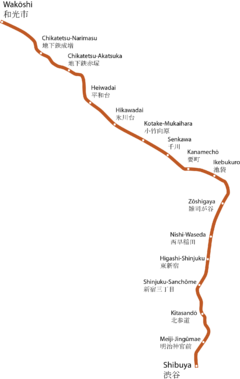Tokyo Metro Fukutoshin Line
| Tokyo Metro Fukutoshin Line | |||
|---|---|---|---|

A line up of Fukutoshin Line rolling stock, June 2009
|
|||
| Overview | |||
| Other name(s) | No. 13 Fukutoshin Line | ||
| Native name | 東京地下鉄副都心線 | ||
| Type | Rapid transit | ||
| Locale | Tokyo | ||
| Termini |
Wakōshi Shibuya |
||
| Stations | 16 | ||
| Daily ridership | 330,096 (2010) | ||
| Operation | |||
| Opened | December 7, 1994 (as Yūrakuchō New Line) June 14, 2008 (as Fukutoshin Line) |
||
| Owner | Tokyo Metro | ||
| Depot(s) | Wakō | ||
| Rolling stock | 7000 series, 10000 series, etc. | ||
| Technical | |||
| Line length | 20.2 km (12.6 mi) | ||
| Track gauge | 1,067 mm (3 ft 6 in) | ||
| Electrification | 1,500 V DC overhead catenary | ||
| Operating speed | 80 km/h (50 mph) | ||
|
|||
The Tokyo Metro Fukutoshin Line (東京地下鉄副都心線 Tōkyō Chikatetsu Fukutoshin-sen?), formally the No. 13 Fukutoshin Line (13号線(副都心線) Jūsangō-sen (Fukutoshin-sen)?), is a subway line operated by the Tokyo subway operator Tokyo Metro in west-central Tokyo, Japan. The newest line in the Tokyo subway network, it opened in stages between 1994 and 2008.
The Fukutoshin Line is the deepest metro line in Tokyo, with an average depth of 27 meters. At Shinjuku-sanchōme Station, the line passes under the Marunouchi and above the Shinjuku lines at a depth of 15 meters, with a gap of only 11 centimeters to the Shinjuku Line tunnel. The deepest section is at the immediately adjacent Higashi-Shinjuku Station, where the line goes down to 35 meters, partly due to an underground space reservation for a possible future extension of the Jōetsu Shinkansen to Shinjuku.
It is the second Tokyo Metro line to feature express services, after the Tōzai Line; however, unlike the Tozai Line (where rapid services are only offered on the Tōyōchō – Nishi-Funabashi section), the Fukutoshin Line offers express services throughout the line, a first for Tokyo Metro. Express trains pass local trains at Higashi-Shinjuku, where additional tracks are installed for this purpose. Local trains stop at all stations.
...
Wikipedia

